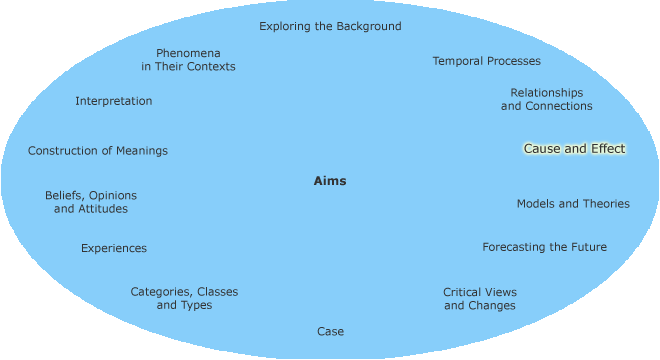Cause and Effect
Humanistic research may aim to determine and establish cause and effect relations or causality between phenomena. Indicating cause and effect requires an experimental research setting. Relationships between variables can also be studied by investigating the co-variation or correlation between the cause and the effect and by measuring the strength of the effect between variables. This does not constitute proof of causality.
Strategies
Research aiming to explore causal relationships between phenomena based on concrete observations and measurements can be defined as empirical research. You need to use a quantitative research strategy to show the explicit cause and effect relationships. The aims of qualitative research in exploring causes and effects usually focus on describing the connections between phenomena rather than an analytical indication of causality.
Research into explicit cause and effect relationships can be based on several strategies, for example:
Longitudinal research enables you to explore causality over a long period of time.
Experimental research enables you to observe and indicate causality.
Data Collection
You can study cause and effect between phenomena through different types of data collected by a variety of methods. You can use either data collected for previous research by another researcher (existing concrete materials) or collect / produce your own data during the research process. You can use a variety of research strategies: Population researchis suitable when the quantity of available data on a phenomenon is small. Sampling is suitable when the quantity of available data on a phenomenon is too large for you to analyse all of it. Random sampling enables you to select a small element without bias. Purposive sampling (goal-directed sampling) enables you to select samples that match the aim of the study. You can collect data for research on cause and effect through, for example, an experiment or survey to collect the data.
Data Analysis
In the strict sense quantitative analysis alone is suitable for analysing cause and effect.
Philosophy in Science
Quantitative analysis methods are based on positivism, which stresses the production of knowledge through exact measuring and use of numeral variables. Views emphasizing the exactness and correctness of measured knowledge are based on realism, which views knowledge as objective.

